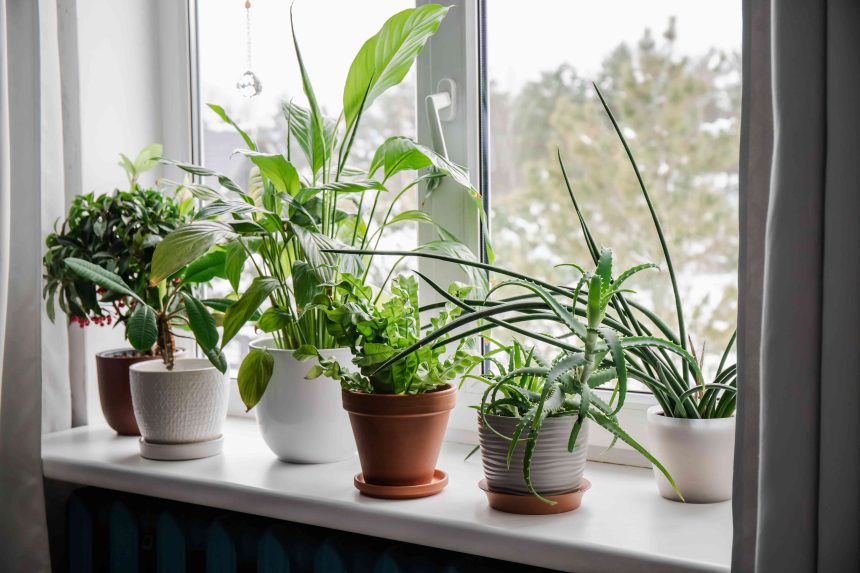Unlike outdoor plants, indoor plants are entirely dependent on us for their care and they need to be fertilized and watered regularly during the growing season. But when winter arrives and the days grow short, the growth rate of houseplants changes and their fertilizer needs change too. Whether or not indoor plants need fertilizer in winter varies, so we put together this quick guide to answer all of your winter fertilizer questions.
Why Do Houseplants Need Fertilizer?
Houseplant fertilizer contains essential nutrients, like phosphorous, nitrogen, and potassium, which plants need for healthy growth. Fertilizers are essential during spring and summer when plants are actively growing and flowering, but they may be needed at other times of the year depending on the plant.
Without fertilizer, houseplants can become stunted and stop flowering and their leaves may turn yellow or brown. However, providing plants with too much fertilizer at the wrong time of the year can also lead to issues, such as root and leaf burn.
Should You Fertilize Houseplants in Winter?
During the winter months, houseplants receive less natural light and they don’t grow as quickly. As a result, plants generally don’t need much or any fertilizer in winter. But this can vary depending on the plant and how you grow it.
- If you’re keeping your houseplants in natural light and they aren’t producing new leaves or flowers, you can usually skip the fertilizer altogether in winter. Your plants will also generally not need fertilizer if they were recently repotted into a nutrient-rich potting mix.
- If your plants are growing under grow lights and they’re actively producing new leaves and flowers, you may want to provide them with a bit of diluted fertilizer in winter. Fertilizer may also be needed if your plants are displaying signs of nutrient deficiencies, such as stunted growth or yellowing leaves with visible green veining.
Keep in mind that less is more when it comes to fertilizing; overfeeding plants causes harm much faster than underfeeding. So, if you’re in doubt about fertilizing, it may be best to avoid using any fertilizer in winter unless your plants look like they’re struggling. You can start fertilizing again when your plants produce new leaves in spring.
Winter Fertilizing Tips
Because plants don’t absorb nutrients as readily in winter as they do in summer, fertilizers are more likely to build up in the soil at this time of the year. If you do decide to fertilize your plants in winter, here are a few tips to help you avoid over-fertilizing.
- Choose liquid organic fertilizers. Liquid organic fertilizers are the best choice for winter since they don’t build up in houseplant soil as fast as granular fertilizers.
- Dilute fertilizers before application. Even if your plants are actively growing in winter and need fertilizer, don’t apply the fertilizer straight. Instead, dilute the fertilizer with water to ¼ strength before application.
- Apply fertilizer as needed. Diluted fertilizer can be applied to actively growing plants about once a month. However, there is no “one size fits all” rule when it comes to winter fertilizing and you may need to adjust your fertilizing schedule depending on your plant.
- Use overhead watering. Bottom watering works well for many houseplants, but it can allow fertilizer salts to build up in pots. To avoid this issue, water your houseplants using the top-down watering method or alternate bottom watering with overhead watering.
- Adjust lighting as needed. Make sure your houseplants are receiving adequate light in winter before you fertilize them. Plants absorb fertilizer better when they get plenty of light.
- Watch for signs of overfertilizing. Even the most careful gardener can accidentally overfertilize plants from time to time. If your plants display signs of fertilizer stress, such as leaf drop or browning around the leaf margins, stop fertilizing.
Caring for Houseplants in Winter
Many houseplants don’t need fertilizer in winter. But that doesn’t mean that you can’t enhance your plants with the right care. Beyond fertilizer, here are a few more ways to help your houseplants grow better during the winter months.
- Add a grow light. Some houseplants need more light than others. But if your plant’s leaves are drooping, turning pale, or stretching towards the light, you may want to add a grow light.
- Keep leaves clean. Dust and debris build up on plant leaves and make it harder for houseplants to photosynthesize. However, you can help your plants absorb the winter light they need by wiping your plant’s leaves with a damp cloth from time to time.
- Boost humidity. Houseplant leaves often turn brown and crispy in winter due to dry indoor air. Keep leaves lush with a humidifier.
- Check for pests. Pests can sometimes invade houseplant collections and cause issues, like yellow stippling on plant leaves. If you see signs of pests, isolate the infected plant and spray the plant’s leaves with an organic insecticidal soap spray.






